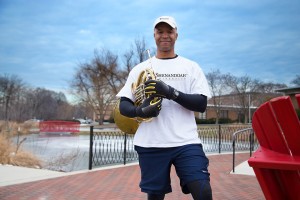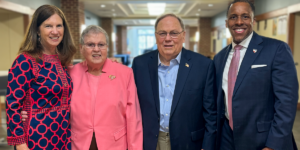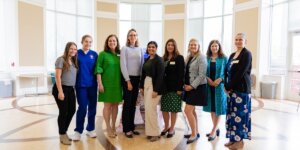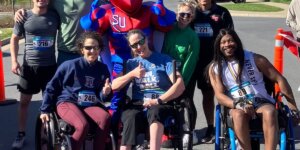For many, running 100 miles is an impossibility. For Joe Lovinsky, it’s just another way to prove he doesn’t quit. Or perhaps he’s just plain stubborn.
“That’s the difference between an ultrarunner and any other runner,” said Lovinsky. “You’re not superhuman, you’re not running any faster than anyone else, you’re just the kind of person who won’t give up. Some people call it stubborn — I say it’s not giving up.”
On Friday, March 28, Lovinsky will embark on his first 100-mile run. Not for a medal, but to raise scholarship money for current and future Shenandoah Conservatory French horn students.
“I thought that if I’m going to put in all this work, all this effort and beat up my body this much, then I really should do it for a cause,” said Lovinsky. “I love the horn, I love horn students, and I have a real feeling for those who are struggling financially.”
Lovinsky can relate to that kind of hardship. The son of Haitian immigrants, he grew up in one of the poorer neighborhoods in Miami, Fla.
Had he followed the path taken by his contemporaries, instead of looking back on a 20-year career with the U.S. Army Band, Lovinsky could be looking out from between the bars of a prison cell.
“My best friends from high school ended up being some of the biggest drug dealers in the United States,” said Lovinsky. “That’s the kind of area I grew up in, but I didn’t limit myself to that kind of a future. I had my goals set on going to Juilliard.”
Lovinsky, an adjunct associate professor of French horn, was first exposed to music in the Miami-Dade County public school system. He signed up for a band class in eighth grade, and immediately fell in love with the French horn and classical music.
“I spent so many hours practicing classical music as a kid that it really had to be a huge part of my life. A lot of times, I think the practicing actually kept me out of a lot of trouble,” said Lovinsky.
The practice paid off as he made his way to the Juilliard School in New York, but every day was a financial struggle.
While between apartments and waiting for a student loan check to come in, Lovinsky dodged security guards to sleep under a piano in one of the practice rooms. Occasionally, he slept just blocks away from Times Square in Bryant Park.
“When all that was going on, I could have very easily said, ‘I’m done with this,’ and just moved onto something else,” said Lovinsky. “But I had my mind focused on the goal of becoming a professional horn player, and I knew that if I put in the work, I would stand as good a chance as anyone.”
Fast-forward to July 2013, when Lovinsky did something you just don’t do. He retired from the U.S. Army Brass Quintet, which is unheard of for someone still in their musical prime. Lovinsky enjoyed a fulfilling career as first horn in the U.S. Army Band, and he played luncheons at the White House, funerals at Arlington National Cemetery, Purple Heart ceremonies and everything in between.
“We performed all kinds of music in all kinds of places — jazz, classical, pop, a lot of patriotic music,” said Lovinsky. “You just had to be ready every day to play whatever was thrown in front of you. I got a great deal of performance practice — probably more than I could at any other job I would have taken. I know that I’ve played my horn more hours than pretty much any horn player that I know, simply because of the nature of the job.”
 Now, he’s living out yet another dream by passing on his craft to young French horn players at Shenandoah University. And he’s decided to show his support in a different kind of way.
Now, he’s living out yet another dream by passing on his craft to young French horn players at Shenandoah University. And he’s decided to show his support in a different kind of way.
A few years ago, during a particularly tumultuous time in his life, Lovinsky started jogging one night along the Mount Vernon Trail. He ran to the end of the trail, which stops at Mount Vernon, the former home of George Washington. So, he did what any normal person would do. He turned around and jogged back.
“As I was jogging back, the sun started coming up,” said Lovinsky. “Once I finally made it back to my apartment, I was sweaty and tired, but I felt great. I was just exhilarated. I took a shower, and I went on to work.”
Later that day, he told a friend about his experience. When asked if he knew how far he had run, Lovinsky hadn’t a clue. The friend informed Lovinsky that he had traversed more than 30 miles round-trip, and then said, “Everybody can’t do what you just did. You need to sign up for an ultramarathon.”
Lovinsky has run a handful of ultramarathons since, but he still considers himself a novice. The farthest he’s run at one time is 90 miles.
“I know Shenandoah does all it can to assist students with scholarships and financial aid, but I just thought if I could do something to help even more, then why not do it while I’m accomplishing my 100-miler,” said Lovinsky. “This could be the difference between someone actually graduating and getting a degree or never getting their degree.”
Joe Lovinsky has continually set the bar high for himself. Each time, he’s overcome all obstacles that life has thrown his way. The goal is 100 miles and $5,000. To overcome this final obstacle, he’s going to need your help.
Facebook link — https://www.facebook.com/100milejoe
Twitter link — https://twitter.com/100milejoe




